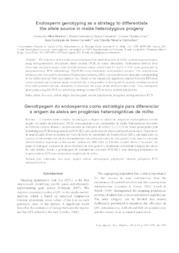Endosperm genotyping as a strategy to differentiate the allele source in maize heterozygous progeny.
Endosperm genotyping as a strategy to differentiate the allele source in maize heterozygous progeny.
Author(s): MARTINS, F. A.; CARNEIRO, P. C. S.; CRUZ, C. D.; CARNEIRO, J. E. de S.; GUIMARAES, C. T.
Summary: The objective of this work was to distinguish the parental source of alleles in heterozygous progeny using semiquantitative polymerase chain reaction (PCR) in maize endosperm. Endosperms derived from direct and reciprocal single-cross hybrids between maize inbred lines L3 and L1113-01 were genotyped by semiquantitative PCR methodology (SQ-PCR) using fluorescent microsatellite primers. The amplification products were evaluated by the ratios of fluorescence intensity (RFI), calculated between the peaks corresponding to the alleles derived from each parental line. Based on the statistically significant contrast between RFI mean values of direct and reciprocal single-cross hybrids, it was possible to distinguish the number of alleles received from each parental line and, ultimately, to determine the origin of the alleles of each cross. Thus, endosperm genotyping using SQ-PCR is a promising strategy to map QTL in maize outbred populations.
Publication year: 2009
Types of publication: Journal article
Unit: Embrapa Maize & Sorghum
Observation
Some of Embrapa's publications are published as ePub files. To read them, use or download one of the following free software options to your computer or mobile device. Android: Google Play Books; IOS: iBooks; Windows and Linux: Calibre.
Access other publications
Access the Agricultural Research Database (BDPA) to consult Embrapa's full library collection and records.
Visit Embrapa Bookstore to purchase books and other publications sold by Embrapa.

